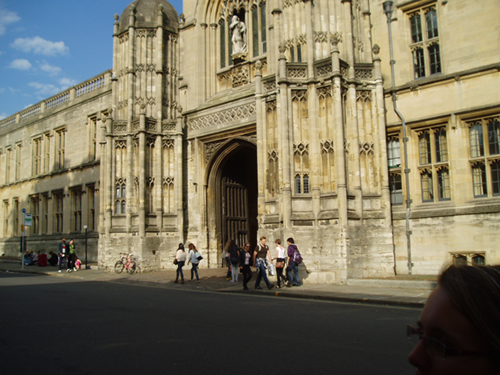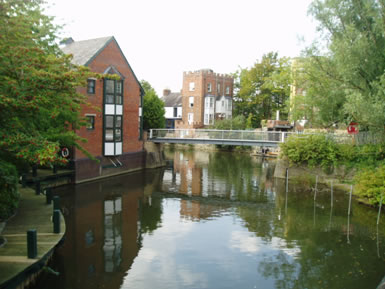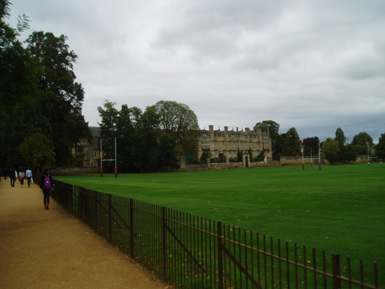A Semester of Study Abroad at Oxford
Dreaming Spires and Essay Crises
Article and photos by Mickey Jackson

|
|
The entrance to Christ Church in Oxford.
|
When I was selected to spend a fall semester at the University of Oxford, I was excited but wondered whether I had chosen the right program. After all, could a semester in an English-speaking country whose culture is broadly similar to that of the US be considered an “authentic” study-abroad experience? Sure, people were impressed when I told them that I was going to Oxford, but should I have perhaps gone somewhere more “adventurous,” more different from home? Fortunately, my occasional moments of doubt proved to be unfounded.
The reality is that the experience of studying at Oxford is far, far different from anything you will find at an American university. There are two primary reasons for this: the collegiate system and the tutorial method of instruction. The tutorial method will stretch your mind and develop your intellectual abilities in ways you never thought possible. At the same time, the collegiate system can help ensure that your time at Oxford is as much of a social experience as an academic one. However, a few practical details are important to share before I discuss these and other unique aspects of my time at Oxford.
Getting to Oxford
I attended Oxford through a pre-existing program organized by my home university (the Catholic University of America (CUA) and administered locally by the Oxford Programme for Undergraduate Studies (OPUS). That semester, about 60 other students participated in OPUS — 15 from CUA and the rest from George Mason University, Azusa Pacific University, and several different schools. Based on my experience, I strongly recommend that you start with programs offered through your university when you're researching study abroad programs. I found this highly advantageous because it more or less guaranteed that my course credits would transfer, thereby sparing me a significant administrative hassle.
Furthermore, all tuition payments to Oxford and room and board payments to OPUS were handled by CUA; I paid my regular tuition, plus a $5000 program fee, to CUA, and the study abroad office handled all the details. The flip side of doing it this way is that tuition at Oxford is lower than at a typical American private university. Direct enrollment may save you money if you are willing to take on extra administrative work and an additional risk of your course credits not transferring.
With regard to visa requirements, the British government makes it easy for students who spend a semester there. As long as your stay in the UK is at most six months, you do not need to apply for a study visa in advance; the passport stamp you get at the airport will be sufficient. With that said, when you first enter the UK, it is advisable to have a copy of your Oxford acceptance letter on your person; the border agent will likely ask about the purpose of your visit to the UK, and if you respond that you are there to study, may want to see your letter. If you stay for an entire year, you must obtain a visa.
The UK has very tight restrictions on foreign workers, so you will likely be unable to find a job during your stay.
The University of Oxford: The Basics
The fastest way to identify yourself as a tourist in Oxford (aside from your American accent) is to ask the following question: “Where is the university campus?” It is somewhat of a misnomer to speak of “the University” as if it were a single body. Instead, Oxford is a confederation of 36 independent colleges. Each college has living accommodations, a dining hall, recreational facilities, and student government. Furthermore, each college is responsible for its students’ tutorial instruction (more on this below). The university sets instructional standards for the colleges to follow, organizes lectures, administers examinations, and confers degrees.
If you were a high school senior applying to spend your undergraduate years at Oxford, you’d have the option of applying to a particular college; however, as a study abroad student, you’d probably be assigned one. I was assigned to Christ Church, one of the better-known colleges due to its famous alums (including William Penn and Lewis Carroll), its somewhat tumultuous history (King Charles I used it as his headquarters during the English Civil War before he was beheaded), and the fact that a few scenes from the Harry Potter movies were filmed there. Other colleges that accept many study-abroad students include New College (despite its name, founded in 1379), St. Catherine’s College, and Jesus College.
Because each college has only a few hundred students, this system offers an excellent opportunity for you, as a study abroad student, to get to know your classmates despite the short length of your stay. At the minimum, eat in your college’s dining hall at least once a week. This experience is nothing like what you’re probably used to at your home university. There is no buffet-style dining; instead, you sit at a long wooden table, and waitpeople bring you whatever the chefs have chosen to serve on that particular night (most colleges offer vegetarian, gluten-free, and other dietary-sensitive meals). The food quality varies by college, but I had no complaints about the meals at Christ Church.Meals generally last an hour; they won't let you in if you don’t show up at the designated time. Since I did not live at Christ Church (most organized programs will place you in houses in or around Oxford with other American students), eating “in hall” was by far the best method I found of actually interacting with my fellow Oxford students. Another excellent way to do so is to join one of your college’s sports teams. Rowing is particularly popular, and most colleges won’t require you to have any experience to join the team for the semester.
Taking advantage of college meals and activities is vital to getting to know your fellow students because the teaching at Oxford is highly individualized. It revolves around a method known as the tutorial system. Here is how the tutorial system works: each week, your professor assigns you a pile of reading and an essay prompt, which is usually very broad (for example: “Why are school enrollments so low in the least developed countries?”). You have one week to plow through the readings and, based on these and any other sources you can find, write a 2000- to 2500-word essay offering a well-supported answer to the prompt. You then meet one-on-one with your professor for one hour, during which you read your essay aloud. Your professor frequently interrupts you to ask tough questions, poke holes in your arguments, and suggest improvements in your writing. You receive your prompt and reading list for the next week at the end of the hour, and the process starts over. You’ll be assigned problem sets instead of essays for some courses, but the basic procedure is the same.

|
|
The Radcliffe Camera is an iconic domed library. |
In a typical semester, you’ll take two tutorials. Although Oxford students attend lectures, these are meant to prepare them for the exams they take immediately before graduating. As a study abroad student, you will not take exams, so you will probably not be required to attend lectures (although I sometimes find it helpful to sit in on them). You will only spend about two hours per week “in class.” Don’t be fooled, however: chances are you will work harder for those two courses than you ever have as an undergraduate. My tutorial subjects were Development Economics, for which I wrote essays, and Advanced Microeconomics, for which I completed problem sets. On most days, I would aim to be in the library by 9 a.m. at the latest, and, except during a lunch break, often would not leave until after 5 p.m. You’ll probably hear Oxford students talking about their essay “crises,” which generally occur when it’s 10 p.m. on the night before your tutorial. You haven’t even begun your readings. If you want to avoid this situation (and trust me, you do), you must learn to budget your time and exercise self-discipline. Many American students struggle to adapt to the unstructured nature of the tutorial system.
Once you get used to it, however, it’s a precious experience. I never imagined that, over eight short weeks, I could become as much of an expert as I did in my two tutorial subjects. For my Development Economics tutorial, I often read 30 or 40 journal articles each week, about 10 of which would make it into that week’s essay. For Advanced Microeconomics, I was primarily responsible for teaching myself the material in the problem sets; the lectures were helpful, but I still spent much time poring over textbooks. If this sounds intimidating, it is.
However, you will quickly realize that you
can
do it and will be better off doing it. Learning just how much you can is pleasantly surprising and immensely satisfying. The first “job well done” you get from your tutor (it may take a few weeks, but it’ll happen) will make it all worthwhile. There is no question that the tutorial system will make you a better researcher, writer, and arguer. But, in my opinion, its most valuable benefit is the self-confidence you will have gained by the end of the semester.
The City of Oxford
Of course, no study abroad experience should consist of all work and no play. Oxford, known for its architectural gems, is a lovely place to spend a semester. The city’s skyline is dotted by domes, turrets, and spires, hence its nickname “the city of dreaming spires.” Two rivers, the Cherwell and the Isis (the latter of which becomes the Thames as it flows towards London), run through the city, offering beautiful hiking, picnicking, and reading locations. As you would expect in a famous university town, Oxford has several excellent museums, the most famous of which is the Ashmolean. Christ Church Cathedral, like the Sheldonian Theatre, is well worth visiting. I’d say the same about the Bodleian, the main university library. Still, as a student, you’ll spend much time there!

|

|
|
The Isis River in Oxford.
|
Christ Church Meadow.
|
The Bottom Line: Should You Study at Oxford?
A semester at Oxford will likely be heavier on academics than a typical study abroad experience. The University of Oxford is committed to providing a rigorous academic environment. Furthermore, suppose you want to learn a new language or immerse yourself in a foreign culture. In that case, you’d be better off choosing a different location. If you want to hone your research and writing skills, gain in-depth knowledge of subjects that interest you, and do so in a setting like no other, I cannot recommend Oxford highly enough. Most American universities have some program at Oxford, either through OPUS or through another on-site administrator, so chances are it won’t be too difficult to make it happen. I look back fondly on my time amidst the dreaming spires, and I have no doubt you will, too.
Micky Jackson was a senior economics major at The Catholic University of America in Washington, DC, originally from Tucson, Arizona. Upon graduating in May 2013, he will pursue a Master of Science in Public Policy and Management at Carnegie Mellon University.
|
